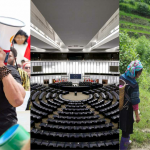International Political Economy | University of Sheffield
Explore the economy through a political lens and question the ideas and decisions that shape it. On our International Political Economy MA (formerly Global Political Economy) you'll take part in cutting-edge research on how to achieve more equal and sustainable societies.
How does the programme provide content to ensure students achieve an understanding of a reasonably diverse set of perspectives on understanding economies?
This course is about the study of contemporary capitalism; how it operates, who wins and loses from it, and possibly how we can make the world a better place. On this course, you will engage with the most pressing problems in the global political economy and apply innovative ways of thinking to contemporary policy issues such as: sustainable capitalist development; inequalities and poverty; migration; environmental degradation and climate breakdown; rapid technological breakdown and emergent new powers.
As part of the course, you will take the core module for the programme: Approaches to Political Economy. This module provides an in-depth overview of competing ways to analyse the economy, including weeks on thinkers such as Adam Smith, Karl Marx, and Karl Polanyi, and feminist, post-colonial, and ecological approaches.
How does the programme ensure students understand the interaction between economic and ecological systems?
The interaction between economic and ecological systems is to some extent built into political economy and our teaching of it.
We also offer a specialist, optional module on the Political Economy of Global Environmental Change.The aim of this module is to introduce students to the major debates in the political economy of environment. It will examine central debates around climate change, the Anthropocene, the commons, the green economy, biodiversity loss, population, sustainability and environment induced conflict. The course makes use of specific case studies to illuminate the wider conceptual debates.
How does the programme ensure students understand how to critically explore real-world evidence, both qualitative and quantitative?
Political economy is very much situated in the real world, and there is no formal modelling on this programme. To ensure the relevance of our teaching, we ensure that our modules have a blend of traditional essays and more applied assessments, such as blogposts and policy reports. Analysing quantitative data is not a required part of the programme, but students are welcome to explore and bring in these skills where appropriate.
What pedagogical approaches does the programme use to ensure that students examine the historical context, assumptions and values in all economic thinking?
How does the department ensure that the teaching culture and capacity to deliver economic pluralism are continually improving?
Other information:
Relevant indicative optional modules include:
- Capitalism and Crisis
- Development and the State
- Global Health and Global Politics
- The Political Economy of Poverty and Inequality
- Political Economy of Global Environmental Change
- Global Politics of Climate Change
- Analysing the Policy Process
- Policymaking in the Real World
- Wellbeing in Politics and Policy
Country:
United Kingdom
University:
University of Sheffield
Course name:
International Political Economy
Department/school:
Department of Politics and International Relations
Course level:
Taught Masters
Course language:
English

 all programmes
all programmes